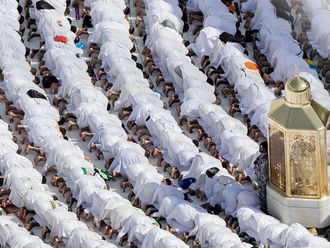Nairobi: Kenyan President Uhuru Kenyatta said on Monday he will go to the International Criminal Court, where he faces charges of crimes against humanity, becoming the first sitting president to appear.
“Let it not be said that I am attending the status conference as the president of Kenya,” Kenyatta told parliament as several lawmakers stamped their feet in support.
“Nothing in my position or my deeds as president warrants my being in court,” said the president, who is due to appear in The Hague-based court on Wednesday.
Kenyatta, 52, faces five counts at the ICC over his alleged role in masterminding post-election violence in 2007 and 2008 that left 1,200 people dead and 600,000 displaced.
The Kenyan leader has appeared at the ICC before, but not since he was elected president in March 2013.
He said he would take an “unprecedented” move to temporarily hand power over to Deputy President William Ruto — whose trial at the ICC has already began — in order to protect the position of president in the country.
“I will shortly issue the legal notice necessary to appoint Honourable William Ruto, deputy president, as acting president while I attend the status conference,” Kenyatta told a special sitting of both houses of parliament.
“My conscience is clear, has been clear and will remain forever clear,” he said, noting that he had “cooperated with the prosecutor to assist in establishing the truth at all material times”.
It will be Kenyatta’s first appearance as president in court, as he has repeatedly argued he needed to remain in Kenya to fight militants from the Al Qaida-linked Al Shabab group, and manage state affairs.
But he stressed he was going in a personal capacity.
“To all those who are concerned that my personal attendance at the status conference compromises the sovereignty of our people, or sets a precedent for the attendance of presidents before the court, be assured, this is not the case,” he said.
Kenya’s post-electoral unrest shattered the east African country’s image as a beacon of regional stability in late 2007, when opposition chief Raila Odinga accused then president Mwai Kibaki of rigging his way back to power.
What began as political riots quickly turned into ethnic killings of Kenyatta’s Kikuyu tribe, who in return launched reprisal attacks, plunging Kenya into its worst wave of unrest since independence in 1963.
The Kenyan leader’s lawyers previously asked that he be excused from travelling to the ICC, citing a summit in Uganda’s capital Kampala on the same day he was called to attend.












